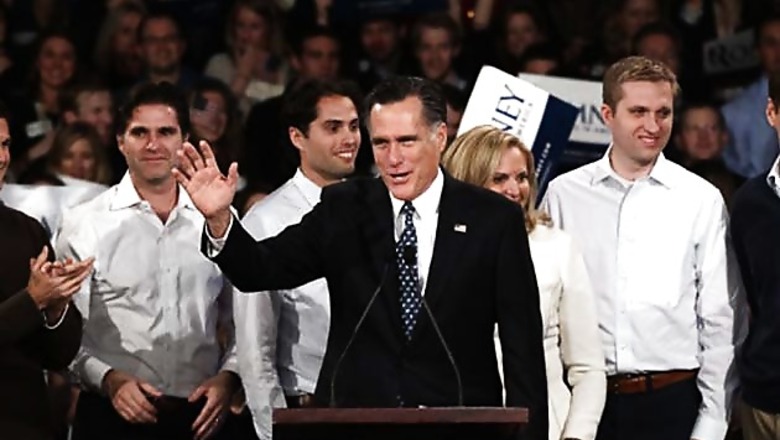
views
Myrtle Beach: Under heavy debate pressure from his rivals, Republican presidential front-runner Mitt Romney defended his record as a venture capitalist, insisted he bears no responsibility for attack ads aired by his allies and grudgingly said Monday night he might release his income tax returns this spring.
"I have nothing in them that suggests there's any problem and I'm happy to do so," he said. "I sort of feel like we're showing a lot of exposure at this point," he added in an apparent reference to the campaign to come against Democratic President Barack Obama.
Romney came under criticism from the opening moments of the debate, the first of two in the run-up to this weekend's first-in-the-South primary in South Carolina. The former Massachusetts governor won the first two events of the campaign, the Iowa caucuses and last week's New Hampshire primary, and leads in the pre-primary polls in South Carolina.
One of his rivals, Newt Gingrich, has virtually conceded that a victory for Romney in South Carolina would assure his nomination as Obama's Republican rival in the fall, and none of the other remaining contenders has challenged that conclusion.
That only elevated the stakes for Monday night's debate, feisty from the outset as Gingrich, Texas Governor Rick Perry and former Pennsylvania Senator Rick Santorum sought to knock Romney off stride while generally being careful to wrap their criticism in anti-Obama rhetoric.
"We need to satisfy the country that whoever we nominate has a record that can stand up to Barack Obama in a very effective way," said Gingrich.
The five men on stage also sought to outdo one another in calling for lower taxes.
Paul won that competition handily, saying he thought the top rate should be zero.
And in a state with a heavy military presence, the tone seemed more aggressive than in earlier debates.
Gingrich drew strong applause when he said: "Andrew Jackson had a pretty clear idea about America's enemies. Kill them."
The debate began hours after Romney reaped an endorsement from former Utah Gov. Jon Huntsman, who suspended his own candidacy and urged the remaining contenders to stop attacking one another for fear it might benefit Obama in November.
The former House speaker and Perry led the assault against Romney's record at Bain Capital, a private equity firm that bought companies and sought to remake them into more competitive enterprises, with uneven results.
"There was a pattern in some companies ... of leaving them with enormous debt and then within a year or two or three having them go broke," Gingrich said. "I think that's something he ought to answer."
Perry referred to a steel mill in Georgetown, South Carolina where, he said, "Bain swept in, they picked that company over and a lot of people lost jobs there."
Romney said that the steel industry was battered by unfair competition from China. As for other firms, he said, "Four of the companies that we invested in ... ended up today having some 120,000 jobs.
"Some of the businesses we invested in were not successful and lost jobs," he acknowledged.
It was Perry who challenged Romney, a multimillionaire, to release his income tax returns. The Texas governor said he has already done so, adding he believes Gingrich will do likewise later in the week.
"Mitt, we need for you to release your income tax so the people of this country can see how you made your money. ... We cannot fire our nominee in September. We need to know now."
Later, a debate moderator pressed Romney on releasing his tax returns.
The answer was anything but crisp.
"But you know if that's been the tradition I'm not opposed to doing that. Time will tell. But I anticipate that most likely I'm going to get asked to do that in the April time period and I'll keep that open," he said.
Prodded again, he said, "I think I've heard enough from folks saying look, you know, let's see your tax records. I have nothing in them that suggests there's any problem and I'm happy to do so. I sort of feel like we're showing a lot of exposure at this point, and if I become our nominee and what's happened in history is people have released them in about April of the coming year and that's probably what I'd do."
Santorum stayed away from the clash over taxes, instead starting a dispute of his own. He said a campaign group supporting Romney has been attacking him for supporting voter rights for convicted felons, and asked Romney what his position was on the issue.
Romney initially ducked a direct answer, preferring to ask Santorum if the ad was accurate.
He then said he doesn't believe convicted violent felons should have the right to vote, even after serving their terms. Santorum instantly said that as governor of Massachusetts, Romney hadn't made any attempt to change a law that permitted convicted felons to vote while still on parole, a law that the former Pennsylvania senator said was more liberal than the one he has been assailed for supporting.
Romney replied that as Republican governor, he was confronted with a legislature that was heavily Democratic and held a different position.
He also reminded Santorum that candidates have no control over the campaign groups that have played a pivotal role in the race to date.
Romney added that the millions in outside dollars are "one of the things I decry" about the current system. At the same time, he has repeatedly refused to denounce the negative ads that the group supporting him has been spending millions to run in early states.
"It is inaccurate," Santorum said of the ad assailing him, seeking the last word. "I would go out and say, 'Stop it. That you're representing me and you're representing my campaign. Stop it.'"
The five remaining candidates also sought to outdo one another in calling for lower taxes.
Paul won that competition handily, saying he thought the top rate should be zero.
Romney has victories in the only two contests of the campaign thus far, the Iowa caucuses and New Hampshire primary earlier this month. Gingrich has conceded that the former Massachusetts governor will likely be the party's nominee if he is similarly victorious in South Carolina, an assertion that none of the others in the race has so far contested.
That raised the significance of the night's debate, as well as another one scheduled for Thursday in Charleston.
Romney is the leader in the public opinion polls in South Carolina, although his rivals hope the state's high, 9.9 per cent unemployment rate and the presence of large numbers of socially conservative evangelical voters will allow one of them to slip by him.
Huntsman was the second campaign dropout to endorse Romney, after former Minnesota Gov. Tom Pawlenty. Minnesota Rep. Michele Bachmann, who quit after a last-place finish in Iowa, has not yet said which of the remaining contenders she supports. Herman Cain, who left the race in December after facing allegations of sexual impropriety, has promised an endorsement soon.
Huntsman's parting announcement included a reference to the differences he and Romney had. But he left the podium without responding to questions about his remark last week, in the run-up to the New Hampshire primary, that Romney was unelectable and out of touch.
It was unclear why Romney did not attend the announcement. He was in town for a later campaign appearance and then the debate.
Gingrich and Perry both began their day at a Martin Luther King Jr. Day observance, where they praised the legacy of the slain civil right leader.
At about the same time, Santorum was complaining that attacks launched against him by the political action committee supporting Romney were lies. The attack on Santorum is patterned after one that helped send Gingrich into a nosedive in the polls in the final weeks of the Iowa caucus campaign.
Gingrich made similar demands on Romney then to rein in his supporters, but was ignored.
Paul, who generally keeps a light campaign schedule, addressed the Faith and Freedom Coalition forum in the afternoon. The Texas congressman cast his libertarian message in religious terms, noting the Bible speaks up for private property ownership and sound currency.




















Comments
0 comment